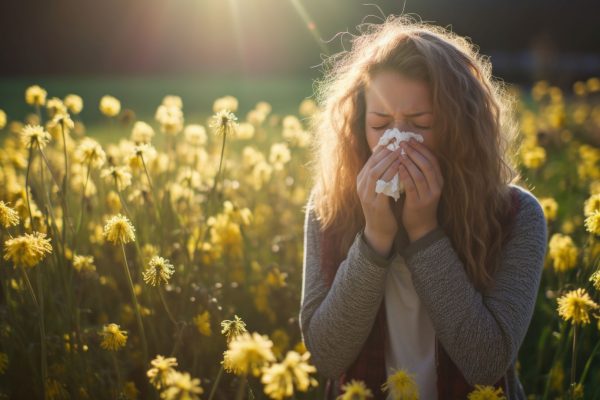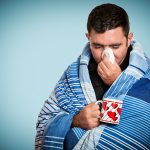Now that the weather is warming up, blooming trees and shrubs are releasing pollen into the air. And you know what that means…
Spring allergy season has officially arrived in many parts of the U.S.
If it seems like your allergies started early this year, you’re not alone. According to the Asthma and Allergy Foundation of America, you can blame it on climate change.
Growing season – which is when high levels of pollen are released – is starting earlier each year, and lasting longer. This creates a longer and more intense spring allergy season.
That’s bad news for allergy sufferers. Nobody likes to spend their days sneezing and dealing with a runny nose or itchy, watering eyes.
Why Do You Have Allergies in the First Place?
For the most part, allergies are the result of an overactive immune response. You see, your immune system is on guard, 24/7, to protect you against invaders like bacteria and viruses.
But when you have an allergy, your body may overreact.
Harmless substances like pollen or mold are seen as enemies. Your system launches into attack mode. It releases antibodies to protect itself and histamine production goes into overdrive. That’s when your allergy symptoms start.
It’s also when you start reaching for antihistamine pills and nasal sprays. But you might want to rethink the use of this sort of allergy medication.
While popping a Benadryl every now and then probably won’t result in too much harm, when you start using it on a regular basis, it can become a problem.
Specifically, antihistamines have something called “anticholinergic activity.” This means they block the action of acetylcholine in your brain.
Acetylcholine is a compound that has a crucial role in brain function. It is specifically important when it comes to memory, learning and attention. It is also necessary when it comes to your brain’s ability to maintain a strong connection between neurons.
So when someone takes antihistamine drugs on a regular basis, whether prescribed or over the counter, it causes damage to all sorts of brain functions. In fact, numerous studies have linked antihistamines and other anticholinergic drugs to an increased risk of dementia, especially in people over the age of 65.
While the cognitive damage cause by antihistamines can be devastating, the damage increases exponentially if you also take other anticholinergics, such as cold medications, sleeping pills or bladder control drugs.
Simple Steps to Tame Your Spring Allergies
One of the first things I recommend to allergy patients is to take quercetin. It works exactly like an antihistamine, but without the damaging effects on brain function.
You can find it in foods like onions and garlic. But you can’t really get the amount you need in these foods. Just add a supplement of 200 mg to 500 mg twice daily with meals. (Look for a supplement that also contain bromelain to help improve absorption.)
Beyond that, it all comes down to setting up some personal rules for yourself.
One of my daughter’s in-laws is a perfect example of this. Every step he takes is to prevent himself from an allergic reaction – and those steps duplicate what I recommend to my patients.
Just a few weeks ago he headed up to Maryland.
The first thing he did was mask up for the trip. After he arrived at his destination, he proceeded directly to the bathroom, where he shed his potentially contaminated clothes, placed them in the washer and took a shower. Then he turned on the HEPA filters in his room.
Those were all very smart moves on his part.
In addition to these simple steps, you can take additional precautions within your home…
- Keep windows and doors shut during pollen season. If you have allergies, a fresh breeze in the house isn’t worth the risk of setting them off.
- Give your house a thorough spring cleaning. You might think the floors and furniture only gather dust… but it is a pretty sure bet that pollen and other allergens have accumulated within that dust. Wipe down the furniture, vacuum the carpet, shake the rugs, Swiffer the curtains and mop the floors!
- If you have pets, bathe them regularly. Their fur is already loaded with dander. And when they are romping outdoors, they collect all sorts of other allergens, including pollen.
And don’t forget to keep those HEPA filters clean!
If I am just a week or two late changing mine, they come out covered in a black, grimy fuzz. It is absolutely disgusting! And, even though I don’t have allergies, I definitely do not want these nasty particles ending up in my lungs!
SOURCES:
Pollen Seasons Are Longer and More Intense, Affecting Millions. Asthma and Allergy Foundation of America. Mar 18, 2025. Press Release.
Yang CC, Chien WC, Chung CH, Lai CY, Tzeng NS. The Usage of Histamine Type 1 Receptor Antagonist and Risk of Dementia in the Elderly: A Nationwide Cohort Study. Front Aging Neurosci. 2022 Mar 18;14:811494.
Ghossein N, Kang M, Lakhkar AD. Anticholinergic Medications. StatPearls [Internet]. Treasure Island (FL): StatPearls Publishing. Jan 2025.
Jafarinia M, Sadat Hosseini M, Kasiri N, Fazel N, Fathi F, Ganjalikhani Hakemi M, Eskandari N. Quercetin with the potential effect on allergic diseases. Allergy Asthma Clin Immunol. 2020 May 14;16:36.



